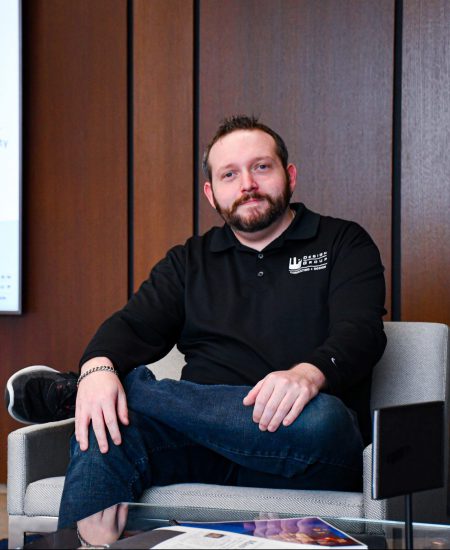National STEAM/STEM Day: Mike Miller
What or who inspired you to pursue a career in technology engineering?
“I was hooked on the technology aspect of engineering from a very young age. This most likely stemmed from trips to my father’s office when I was young, where he would spend his days designing technology systems and drawing audiovisual schematics. It is fascinating to see how a system schematic translates to real-world devices and interconnectivity. The field of technology is constantly evolving, and there is always something new and exciting around every corner.”
“The field of technology is constantly evolving, and there is always something new and exciting around every corner.”
What do you like most about working in this industry?
“As a BIM Manager at IP Design Group and Alvine Engineering, I am very fortunate to be in a position where I can help shape the way information is conveyed to clients, architects, and owners while simultaneously making the process for our designers and engineers more efficient. It is a wonderful feeling to know that creating new Revit families and processes has a tangible impact on our ongoing projects and helps our designers and engineers to better convey their ideas and designs.”
What motivated you to get into teaching at Metropolitan Community College?
“My motivation for teaching comes from when I started in the industry over 10 years ago. When I began as a CAD Technician, I didn’t know much about the industry but had amazing co-workers who would always take the time to answer all the questions that I asked. That level of consideration has helped to embolden me to start teaching at Metropolitan Community College (MCC), where I can further propagate the knowledge I have accrued over the years regarding industry drafting and design standards, influence the next generation of technology designers, as well as provide my point of reference shaped by my individual experiences on what I believe is best for the technology drafting industry.
At MCC, I teach Arch 2815 – Revit Low-Voltage where I explain all the different aspects of what low-voltage encompasses: audiovisual calculations to telecommunications MDF modeling standards and security placement best practices. The class is an 11-week, all-inclusive technology Revit course that will help any student become better prepared to work at a technology consultancy or a mechanical, electrical, plumbing, and technology (MEPT) firm.”
What advice do you have for students starting out in the field?
“The best advice I could give is to stay motivated and not be easily discouraged. Conceptually, while the technology field is fairly straightforward, the learning curve for Revit can be gigantic, especially when it comes to translating design concepts into drawings. Never stop asking questions. Just know that making mistakes is okay, and in fact, it is usually the best way to learn and grow.”
What are some skills/best practices that you encourage your students to gather in their experiences?
“Check your Revit worksets! Jokes aside (kind of, but not really), I would encourage all my students to never stop trying to learn. I know that gets said a lot, but there is genuinely always another aspect of your work that you can learn and improve upon. Even 10+ years down the line, I can say that I have not come close to learning all that the industry has to offer, even in my little corner, which is technology-focused Revit. If you come across a solution to an issue that you encounter, don’t just take the answer and run. Spend time diving deeper into why something works the way it does. Aim to be the “SME” (subject matter expert) in whatever you are pursuing.”
” I would encourage all my students to never stop trying to learn. Aim to be the “SME” (subject matter expert) in whatever you are pursuing.”
Interested in making a difference with us here at IP Design Group? Learn more or send your resume to joinus@ipdesigngroup.com today!



